EDUC-738: Investigating Teacher Attitudes Towards Gifted Students
VerifiedAdded on 2022/08/24
|8
|1745
|19
Report
AI Summary
This report delves into the critical role of teacher attitudes and professional development in supporting gifted students. The research evaluates the impact of teacher attitudes on gifted children, exploring the attitudes of primary teachers, the importance of professional development, and the need for improved knowledge of gifted education. The report reviews existing literature, highlighting conflicting views and identifying gaps in current research. It discusses policy and practice implications, including the need for educational policies that promote awareness and address teacher attitudes. The study also provides recommendations for future research, emphasizing the importance of developing programs that positively affect teacher attitudes and enhance the educational experience of gifted students. References include various scholarly articles that support the findings and arguments presented in the report.
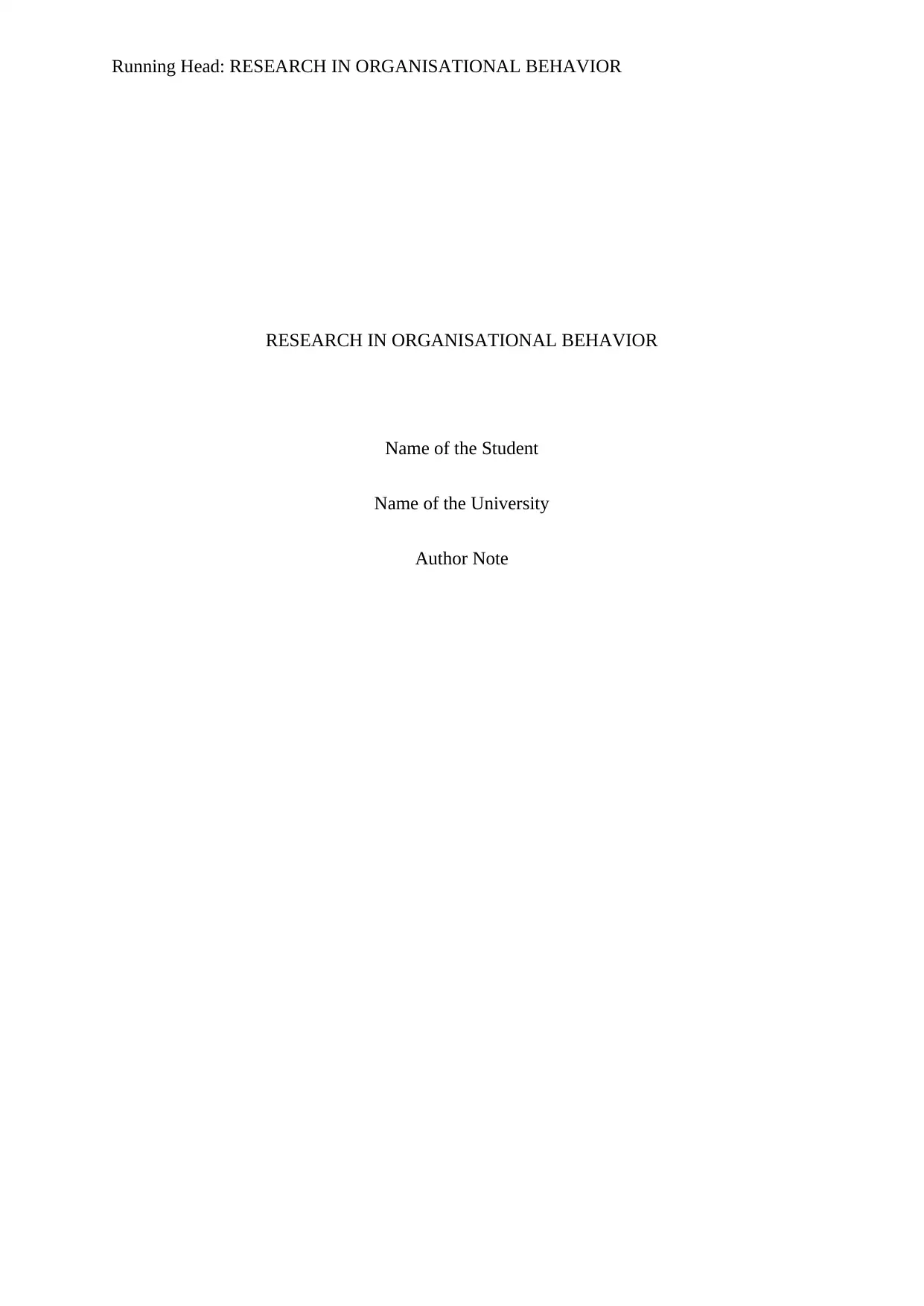
Running Head: RESEARCH IN ORGANISATIONAL BEHAVIOR
RESEARCH IN ORGANISATIONAL BEHAVIOR
Name of the Student
Name of the University
Author Note
RESEARCH IN ORGANISATIONAL BEHAVIOR
Name of the Student
Name of the University
Author Note
Paraphrase This Document
Need a fresh take? Get an instant paraphrase of this document with our AI Paraphraser
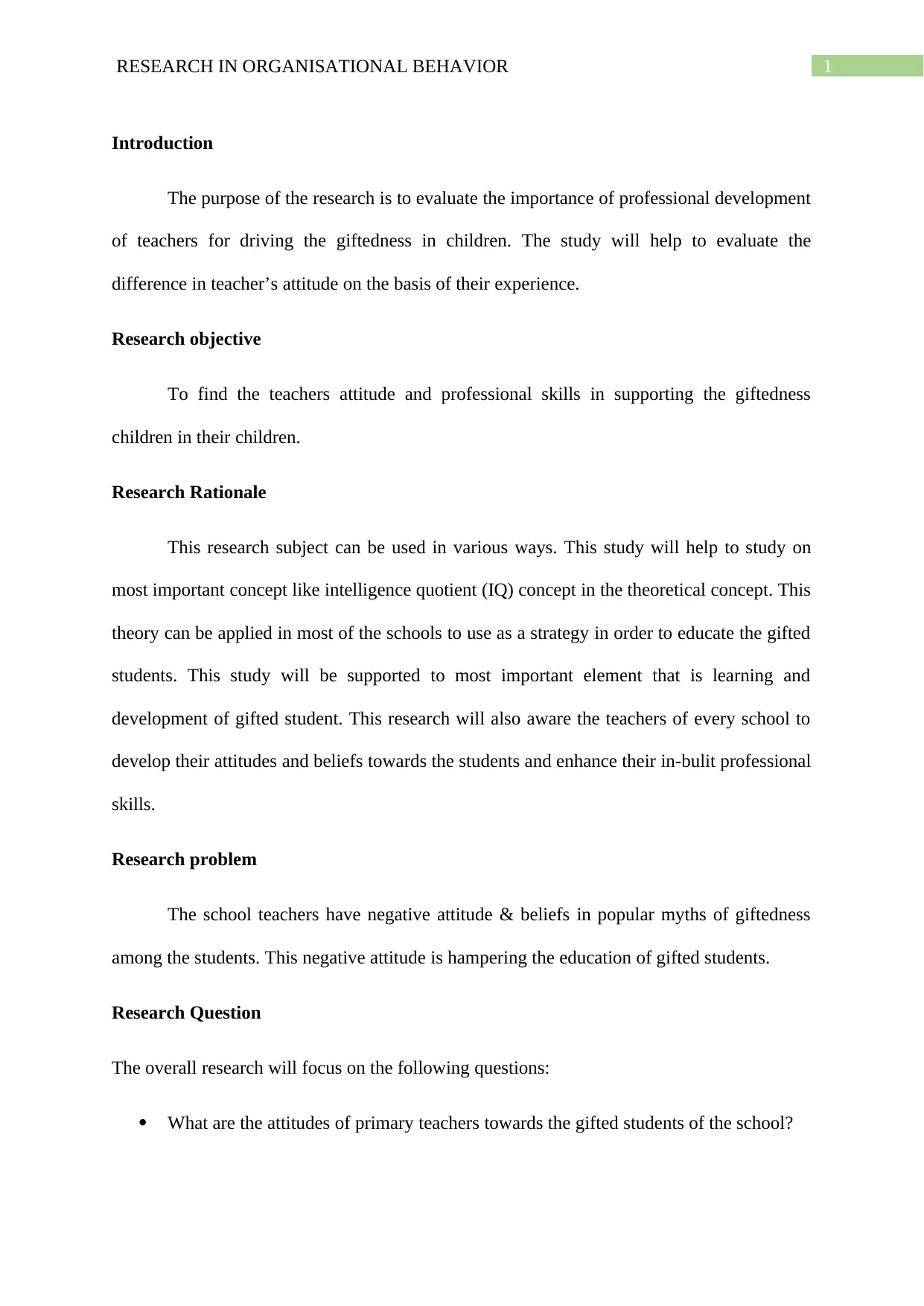
1RESEARCH IN ORGANISATIONAL BEHAVIOR
Introduction
The purpose of the research is to evaluate the importance of professional development
of teachers for driving the giftedness in children. The study will help to evaluate the
difference in teacher’s attitude on the basis of their experience.
Research objective
To find the teachers attitude and professional skills in supporting the giftedness
children in their children.
Research Rationale
This research subject can be used in various ways. This study will help to study on
most important concept like intelligence quotient (IQ) concept in the theoretical concept. This
theory can be applied in most of the schools to use as a strategy in order to educate the gifted
students. This study will be supported to most important element that is learning and
development of gifted student. This research will also aware the teachers of every school to
develop their attitudes and beliefs towards the students and enhance their in-bulit professional
skills.
Research problem
The school teachers have negative attitude & beliefs in popular myths of giftedness
among the students. This negative attitude is hampering the education of gifted students.
Research Question
The overall research will focus on the following questions:
What are the attitudes of primary teachers towards the gifted students of the school?
Introduction
The purpose of the research is to evaluate the importance of professional development
of teachers for driving the giftedness in children. The study will help to evaluate the
difference in teacher’s attitude on the basis of their experience.
Research objective
To find the teachers attitude and professional skills in supporting the giftedness
children in their children.
Research Rationale
This research subject can be used in various ways. This study will help to study on
most important concept like intelligence quotient (IQ) concept in the theoretical concept. This
theory can be applied in most of the schools to use as a strategy in order to educate the gifted
students. This study will be supported to most important element that is learning and
development of gifted student. This research will also aware the teachers of every school to
develop their attitudes and beliefs towards the students and enhance their in-bulit professional
skills.
Research problem
The school teachers have negative attitude & beliefs in popular myths of giftedness
among the students. This negative attitude is hampering the education of gifted students.
Research Question
The overall research will focus on the following questions:
What are the attitudes of primary teachers towards the gifted students of the school?
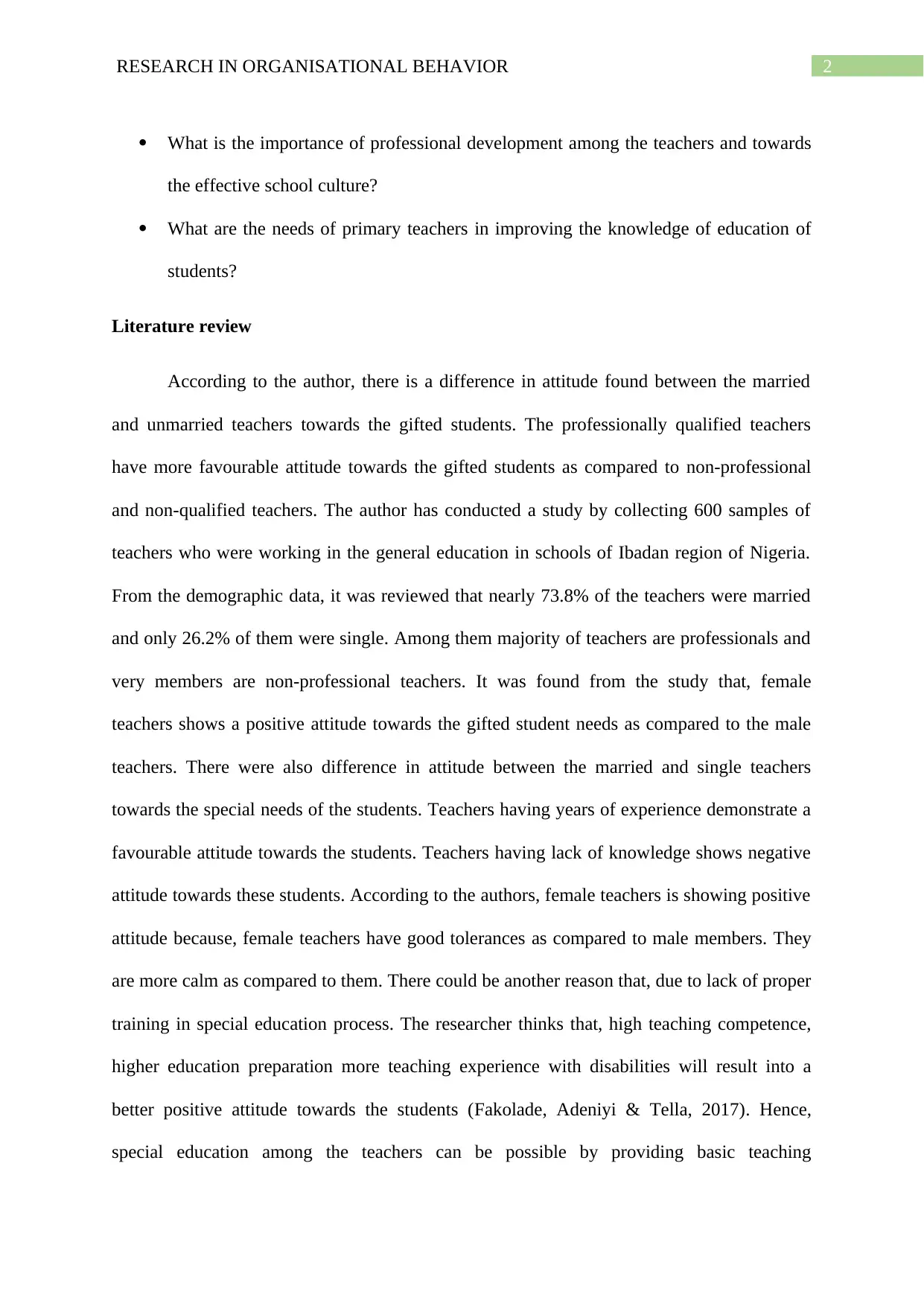
2RESEARCH IN ORGANISATIONAL BEHAVIOR
What is the importance of professional development among the teachers and towards
the effective school culture?
What are the needs of primary teachers in improving the knowledge of education of
students?
Literature review
According to the author, there is a difference in attitude found between the married
and unmarried teachers towards the gifted students. The professionally qualified teachers
have more favourable attitude towards the gifted students as compared to non-professional
and non-qualified teachers. The author has conducted a study by collecting 600 samples of
teachers who were working in the general education in schools of Ibadan region of Nigeria.
From the demographic data, it was reviewed that nearly 73.8% of the teachers were married
and only 26.2% of them were single. Among them majority of teachers are professionals and
very members are non-professional teachers. It was found from the study that, female
teachers shows a positive attitude towards the gifted student needs as compared to the male
teachers. There were also difference in attitude between the married and single teachers
towards the special needs of the students. Teachers having years of experience demonstrate a
favourable attitude towards the students. Teachers having lack of knowledge shows negative
attitude towards these students. According to the authors, female teachers is showing positive
attitude because, female teachers have good tolerances as compared to male members. They
are more calm as compared to them. There could be another reason that, due to lack of proper
training in special education process. The researcher thinks that, high teaching competence,
higher education preparation more teaching experience with disabilities will result into a
better positive attitude towards the students (Fakolade, Adeniyi & Tella, 2017). Hence,
special education among the teachers can be possible by providing basic teaching
What is the importance of professional development among the teachers and towards
the effective school culture?
What are the needs of primary teachers in improving the knowledge of education of
students?
Literature review
According to the author, there is a difference in attitude found between the married
and unmarried teachers towards the gifted students. The professionally qualified teachers
have more favourable attitude towards the gifted students as compared to non-professional
and non-qualified teachers. The author has conducted a study by collecting 600 samples of
teachers who were working in the general education in schools of Ibadan region of Nigeria.
From the demographic data, it was reviewed that nearly 73.8% of the teachers were married
and only 26.2% of them were single. Among them majority of teachers are professionals and
very members are non-professional teachers. It was found from the study that, female
teachers shows a positive attitude towards the gifted student needs as compared to the male
teachers. There were also difference in attitude between the married and single teachers
towards the special needs of the students. Teachers having years of experience demonstrate a
favourable attitude towards the students. Teachers having lack of knowledge shows negative
attitude towards these students. According to the authors, female teachers is showing positive
attitude because, female teachers have good tolerances as compared to male members. They
are more calm as compared to them. There could be another reason that, due to lack of proper
training in special education process. The researcher thinks that, high teaching competence,
higher education preparation more teaching experience with disabilities will result into a
better positive attitude towards the students (Fakolade, Adeniyi & Tella, 2017). Hence,
special education among the teachers can be possible by providing basic teaching
⊘ This is a preview!⊘
Do you want full access?
Subscribe today to unlock all pages.

Trusted by 1+ million students worldwide
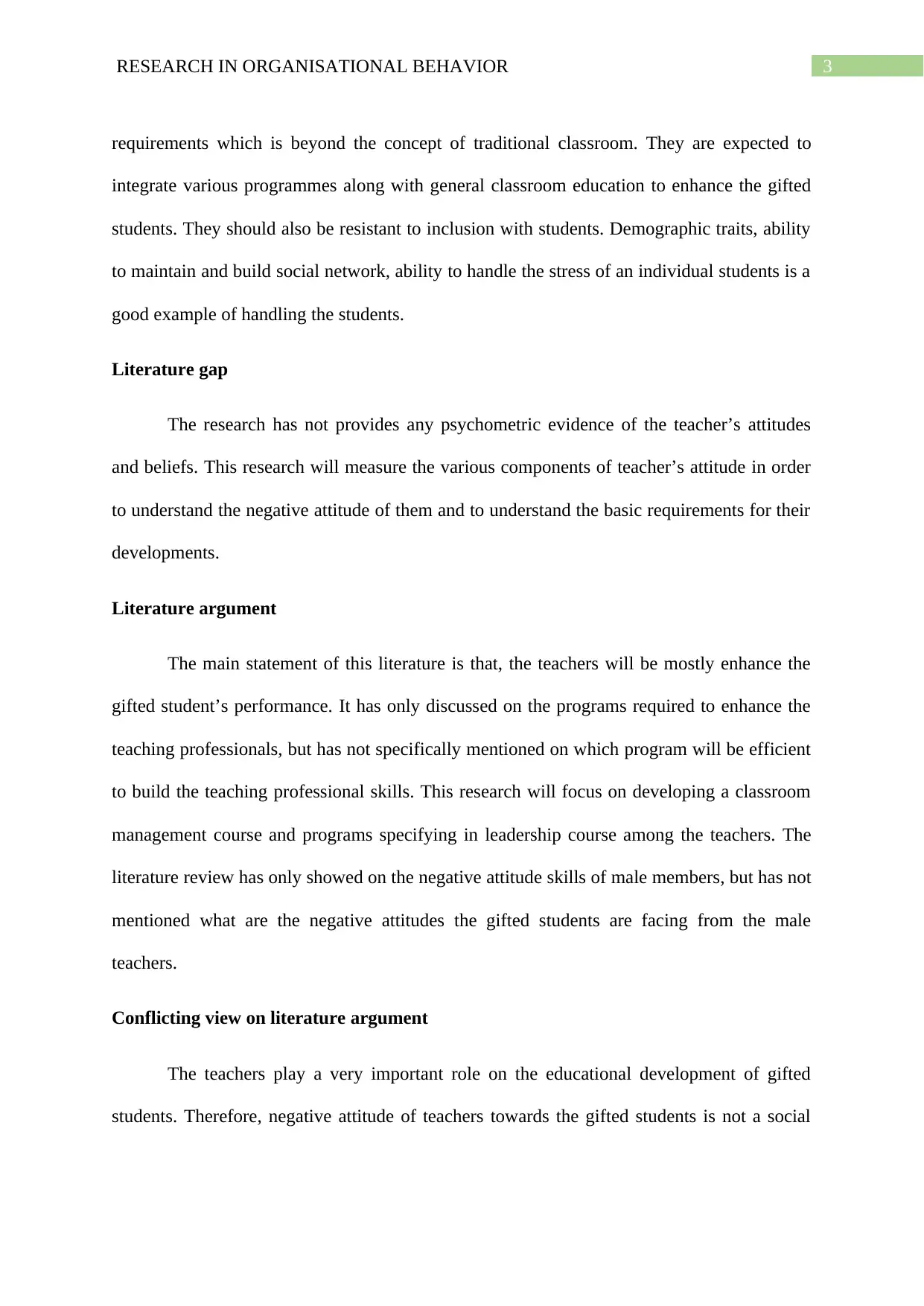
3RESEARCH IN ORGANISATIONAL BEHAVIOR
requirements which is beyond the concept of traditional classroom. They are expected to
integrate various programmes along with general classroom education to enhance the gifted
students. They should also be resistant to inclusion with students. Demographic traits, ability
to maintain and build social network, ability to handle the stress of an individual students is a
good example of handling the students.
Literature gap
The research has not provides any psychometric evidence of the teacher’s attitudes
and beliefs. This research will measure the various components of teacher’s attitude in order
to understand the negative attitude of them and to understand the basic requirements for their
developments.
Literature argument
The main statement of this literature is that, the teachers will be mostly enhance the
gifted student’s performance. It has only discussed on the programs required to enhance the
teaching professionals, but has not specifically mentioned on which program will be efficient
to build the teaching professional skills. This research will focus on developing a classroom
management course and programs specifying in leadership course among the teachers. The
literature review has only showed on the negative attitude skills of male members, but has not
mentioned what are the negative attitudes the gifted students are facing from the male
teachers.
Conflicting view on literature argument
The teachers play a very important role on the educational development of gifted
students. Therefore, negative attitude of teachers towards the gifted students is not a social
requirements which is beyond the concept of traditional classroom. They are expected to
integrate various programmes along with general classroom education to enhance the gifted
students. They should also be resistant to inclusion with students. Demographic traits, ability
to maintain and build social network, ability to handle the stress of an individual students is a
good example of handling the students.
Literature gap
The research has not provides any psychometric evidence of the teacher’s attitudes
and beliefs. This research will measure the various components of teacher’s attitude in order
to understand the negative attitude of them and to understand the basic requirements for their
developments.
Literature argument
The main statement of this literature is that, the teachers will be mostly enhance the
gifted student’s performance. It has only discussed on the programs required to enhance the
teaching professionals, but has not specifically mentioned on which program will be efficient
to build the teaching professional skills. This research will focus on developing a classroom
management course and programs specifying in leadership course among the teachers. The
literature review has only showed on the negative attitude skills of male members, but has not
mentioned what are the negative attitudes the gifted students are facing from the male
teachers.
Conflicting view on literature argument
The teachers play a very important role on the educational development of gifted
students. Therefore, negative attitude of teachers towards the gifted students is not a social
Paraphrase This Document
Need a fresh take? Get an instant paraphrase of this document with our AI Paraphraser
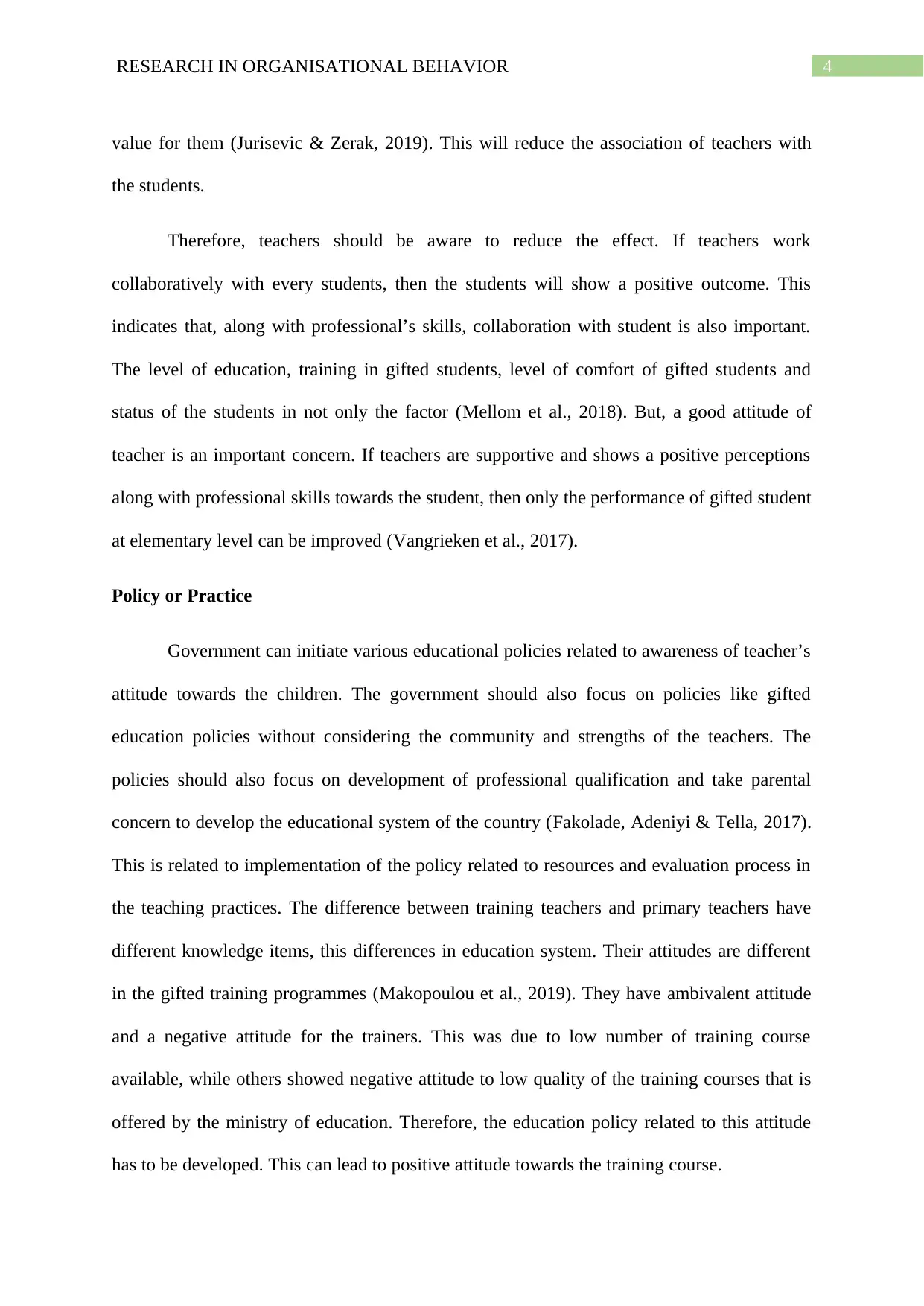
4RESEARCH IN ORGANISATIONAL BEHAVIOR
value for them (Jurisevic & Zerak, 2019). This will reduce the association of teachers with
the students.
Therefore, teachers should be aware to reduce the effect. If teachers work
collaboratively with every students, then the students will show a positive outcome. This
indicates that, along with professional’s skills, collaboration with student is also important.
The level of education, training in gifted students, level of comfort of gifted students and
status of the students in not only the factor (Mellom et al., 2018). But, a good attitude of
teacher is an important concern. If teachers are supportive and shows a positive perceptions
along with professional skills towards the student, then only the performance of gifted student
at elementary level can be improved (Vangrieken et al., 2017).
Policy or Practice
Government can initiate various educational policies related to awareness of teacher’s
attitude towards the children. The government should also focus on policies like gifted
education policies without considering the community and strengths of the teachers. The
policies should also focus on development of professional qualification and take parental
concern to develop the educational system of the country (Fakolade, Adeniyi & Tella, 2017).
This is related to implementation of the policy related to resources and evaluation process in
the teaching practices. The difference between training teachers and primary teachers have
different knowledge items, this differences in education system. Their attitudes are different
in the gifted training programmes (Makopoulou et al., 2019). They have ambivalent attitude
and a negative attitude for the trainers. This was due to low number of training course
available, while others showed negative attitude to low quality of the training courses that is
offered by the ministry of education. Therefore, the education policy related to this attitude
has to be developed. This can lead to positive attitude towards the training course.
value for them (Jurisevic & Zerak, 2019). This will reduce the association of teachers with
the students.
Therefore, teachers should be aware to reduce the effect. If teachers work
collaboratively with every students, then the students will show a positive outcome. This
indicates that, along with professional’s skills, collaboration with student is also important.
The level of education, training in gifted students, level of comfort of gifted students and
status of the students in not only the factor (Mellom et al., 2018). But, a good attitude of
teacher is an important concern. If teachers are supportive and shows a positive perceptions
along with professional skills towards the student, then only the performance of gifted student
at elementary level can be improved (Vangrieken et al., 2017).
Policy or Practice
Government can initiate various educational policies related to awareness of teacher’s
attitude towards the children. The government should also focus on policies like gifted
education policies without considering the community and strengths of the teachers. The
policies should also focus on development of professional qualification and take parental
concern to develop the educational system of the country (Fakolade, Adeniyi & Tella, 2017).
This is related to implementation of the policy related to resources and evaluation process in
the teaching practices. The difference between training teachers and primary teachers have
different knowledge items, this differences in education system. Their attitudes are different
in the gifted training programmes (Makopoulou et al., 2019). They have ambivalent attitude
and a negative attitude for the trainers. This was due to low number of training course
available, while others showed negative attitude to low quality of the training courses that is
offered by the ministry of education. Therefore, the education policy related to this attitude
has to be developed. This can lead to positive attitude towards the training course.
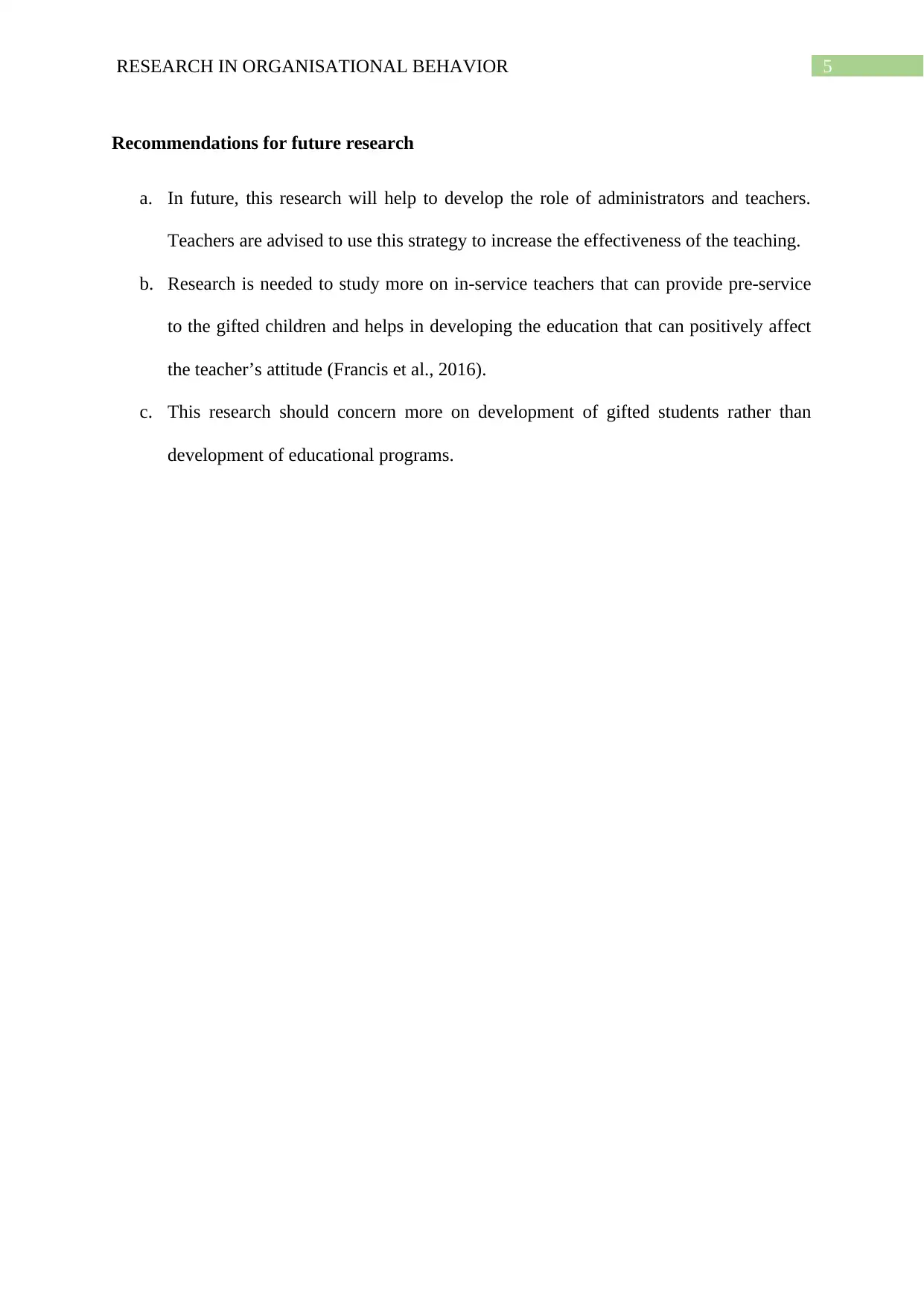
5RESEARCH IN ORGANISATIONAL BEHAVIOR
Recommendations for future research
a. In future, this research will help to develop the role of administrators and teachers.
Teachers are advised to use this strategy to increase the effectiveness of the teaching.
b. Research is needed to study more on in-service teachers that can provide pre-service
to the gifted children and helps in developing the education that can positively affect
the teacher’s attitude (Francis et al., 2016).
c. This research should concern more on development of gifted students rather than
development of educational programs.
Recommendations for future research
a. In future, this research will help to develop the role of administrators and teachers.
Teachers are advised to use this strategy to increase the effectiveness of the teaching.
b. Research is needed to study more on in-service teachers that can provide pre-service
to the gifted children and helps in developing the education that can positively affect
the teacher’s attitude (Francis et al., 2016).
c. This research should concern more on development of gifted students rather than
development of educational programs.
⊘ This is a preview!⊘
Do you want full access?
Subscribe today to unlock all pages.

Trusted by 1+ million students worldwide
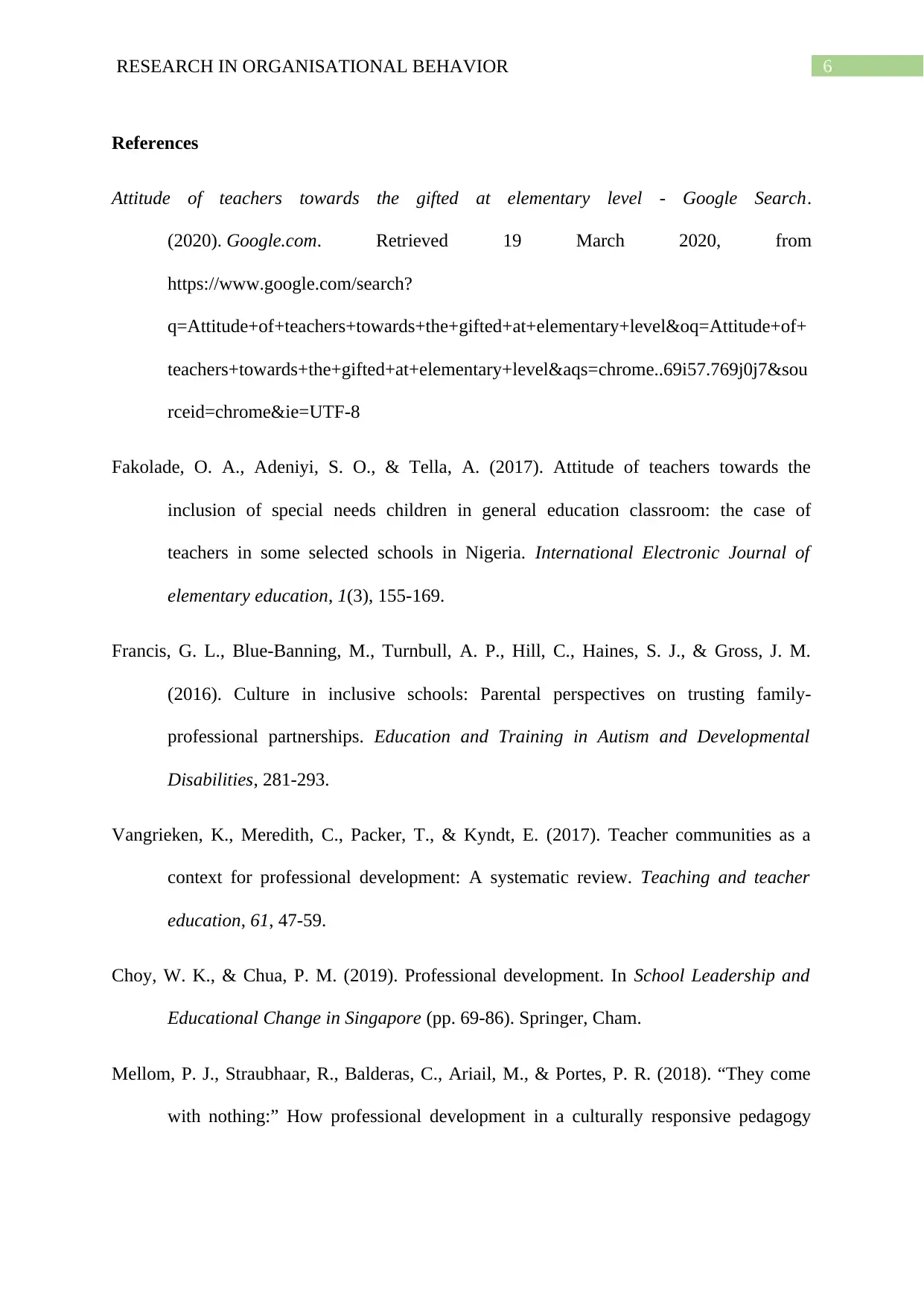
6RESEARCH IN ORGANISATIONAL BEHAVIOR
References
Attitude of teachers towards the gifted at elementary level - Google Search.
(2020). Google.com. Retrieved 19 March 2020, from
https://www.google.com/search?
q=Attitude+of+teachers+towards+the+gifted+at+elementary+level&oq=Attitude+of+
teachers+towards+the+gifted+at+elementary+level&aqs=chrome..69i57.769j0j7&sou
rceid=chrome&ie=UTF-8
Fakolade, O. A., Adeniyi, S. O., & Tella, A. (2017). Attitude of teachers towards the
inclusion of special needs children in general education classroom: the case of
teachers in some selected schools in Nigeria. International Electronic Journal of
elementary education, 1(3), 155-169.
Francis, G. L., Blue-Banning, M., Turnbull, A. P., Hill, C., Haines, S. J., & Gross, J. M.
(2016). Culture in inclusive schools: Parental perspectives on trusting family-
professional partnerships. Education and Training in Autism and Developmental
Disabilities, 281-293.
Vangrieken, K., Meredith, C., Packer, T., & Kyndt, E. (2017). Teacher communities as a
context for professional development: A systematic review. Teaching and teacher
education, 61, 47-59.
Choy, W. K., & Chua, P. M. (2019). Professional development. In School Leadership and
Educational Change in Singapore (pp. 69-86). Springer, Cham.
Mellom, P. J., Straubhaar, R., Balderas, C., Ariail, M., & Portes, P. R. (2018). “They come
with nothing:” How professional development in a culturally responsive pedagogy
References
Attitude of teachers towards the gifted at elementary level - Google Search.
(2020). Google.com. Retrieved 19 March 2020, from
https://www.google.com/search?
q=Attitude+of+teachers+towards+the+gifted+at+elementary+level&oq=Attitude+of+
teachers+towards+the+gifted+at+elementary+level&aqs=chrome..69i57.769j0j7&sou
rceid=chrome&ie=UTF-8
Fakolade, O. A., Adeniyi, S. O., & Tella, A. (2017). Attitude of teachers towards the
inclusion of special needs children in general education classroom: the case of
teachers in some selected schools in Nigeria. International Electronic Journal of
elementary education, 1(3), 155-169.
Francis, G. L., Blue-Banning, M., Turnbull, A. P., Hill, C., Haines, S. J., & Gross, J. M.
(2016). Culture in inclusive schools: Parental perspectives on trusting family-
professional partnerships. Education and Training in Autism and Developmental
Disabilities, 281-293.
Vangrieken, K., Meredith, C., Packer, T., & Kyndt, E. (2017). Teacher communities as a
context for professional development: A systematic review. Teaching and teacher
education, 61, 47-59.
Choy, W. K., & Chua, P. M. (2019). Professional development. In School Leadership and
Educational Change in Singapore (pp. 69-86). Springer, Cham.
Mellom, P. J., Straubhaar, R., Balderas, C., Ariail, M., & Portes, P. R. (2018). “They come
with nothing:” How professional development in a culturally responsive pedagogy
Paraphrase This Document
Need a fresh take? Get an instant paraphrase of this document with our AI Paraphraser
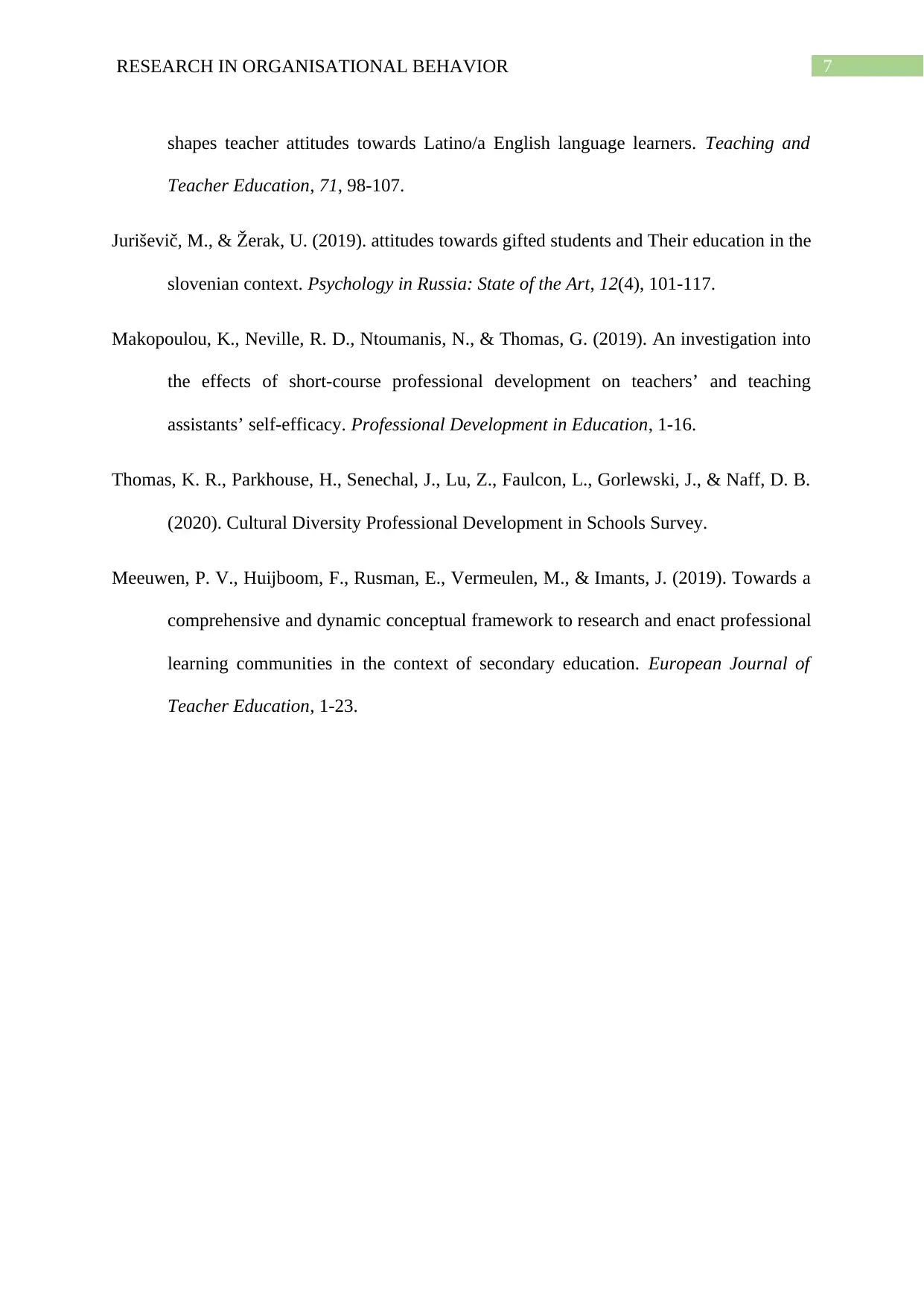
7RESEARCH IN ORGANISATIONAL BEHAVIOR
shapes teacher attitudes towards Latino/a English language learners. Teaching and
Teacher Education, 71, 98-107.
Juriševič, M., & Žerak, U. (2019). attitudes towards gifted students and Their education in the
slovenian context. Psychology in Russia: State of the Art, 12(4), 101-117.
Makopoulou, K., Neville, R. D., Ntoumanis, N., & Thomas, G. (2019). An investigation into
the effects of short-course professional development on teachers’ and teaching
assistants’ self-efficacy. Professional Development in Education, 1-16.
Thomas, K. R., Parkhouse, H., Senechal, J., Lu, Z., Faulcon, L., Gorlewski, J., & Naff, D. B.
(2020). Cultural Diversity Professional Development in Schools Survey.
Meeuwen, P. V., Huijboom, F., Rusman, E., Vermeulen, M., & Imants, J. (2019). Towards a
comprehensive and dynamic conceptual framework to research and enact professional
learning communities in the context of secondary education. European Journal of
Teacher Education, 1-23.
shapes teacher attitudes towards Latino/a English language learners. Teaching and
Teacher Education, 71, 98-107.
Juriševič, M., & Žerak, U. (2019). attitudes towards gifted students and Their education in the
slovenian context. Psychology in Russia: State of the Art, 12(4), 101-117.
Makopoulou, K., Neville, R. D., Ntoumanis, N., & Thomas, G. (2019). An investigation into
the effects of short-course professional development on teachers’ and teaching
assistants’ self-efficacy. Professional Development in Education, 1-16.
Thomas, K. R., Parkhouse, H., Senechal, J., Lu, Z., Faulcon, L., Gorlewski, J., & Naff, D. B.
(2020). Cultural Diversity Professional Development in Schools Survey.
Meeuwen, P. V., Huijboom, F., Rusman, E., Vermeulen, M., & Imants, J. (2019). Towards a
comprehensive and dynamic conceptual framework to research and enact professional
learning communities in the context of secondary education. European Journal of
Teacher Education, 1-23.
1 out of 8
Related Documents
Your All-in-One AI-Powered Toolkit for Academic Success.
+13062052269
info@desklib.com
Available 24*7 on WhatsApp / Email
![[object Object]](/_next/static/media/star-bottom.7253800d.svg)
Unlock your academic potential
Copyright © 2020–2025 A2Z Services. All Rights Reserved. Developed and managed by ZUCOL.





